

Style Manual. Senior secondary online tutorial series. The Library has 4.1 million collection items online that you can access from home.
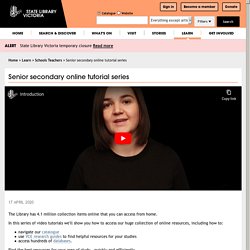
In this series of video tutorials we'll show you how to access our huge collection of online resources, including how to: navigate our catalogueuse VCE research guides to find helpful resources for your studiesaccess hundreds of databases. Find the best resources for your area of study – quickly and efficiently. This series is ideal for VCE, IB and VCAL students. Click through to the videos in this series from this page, or view the playlist in YouTube. Week 10: Credibility Assessment Toolkit. How to Teach Students to Use Wikipedia. When my high school students begin a new assignment that calls for online research, I often ask what websites they shouldn’t use.
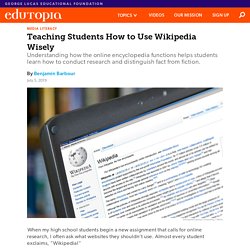
Almost every student exclaims, “Wikipedia!” “Why?” I ask, even though I already know their response. “Because anyone can write anything,” someone typically replies. When I tell them that they can use Wikipedia, the students often look at me in confusion. Wikipedia is the fifth most visited website in the world, with more than 40 million articles accessed every month. Effectively navigating a Wikipedia article can provide students with an opportunity to learn about peer review, sourcing, footnotes, and internet research. A Starting Point Did you know that the South American coati, a small mammal in the raccoon family, is also known as the Brazilian aardvark? Wikipedia, like much of the internet, is the Wild West of information.
Students should understand that Wikipedia is a starting point. EdWebet102 - Scrap CRAAP. Edwebet101 - Evidence. Researching in the Primary Classroom - Teaching in the Primary Years. Our students are so lucky to be able to find many of the answers to their questions via a quick search of the Internet. With so much information available at their fingertips, students can search any topic at any time.
This can be very powerful and so useful, but on many occasions our students are faced with an overwhelming number of search results, many of which aren’t relevant to their topic of research and their reading and comprehension abilities. Search Engines There are a many search engines that support students in finding relevant information for their topic of research and that provide results that our students can comprehend.
The search engines I recommend for my students are; Kidrexwww.kidrex.org KidRex is a fun and safe search for kids, by kids! Kiddlewww.kiddle.co Kiddle is a safe visual search engine that searches for information, images, video, and news. Boolean Operators - Research Skills Tutorial - LibGuides at Empire State College. Internet Country Codes - two letter nation abbreviations. Electronic Mail Internet Country Codes AD Andorra AE United Arab Emirates AF Afghanistan AG Antigua and Barbuda AI Anguilla AL Albania AM Armenia AN Netherland Antilles AO Angola AQ Antarctica AR Argentina AS American Samoa AT Austria AU Australia AW Aruba AZ Azerbaidjan.
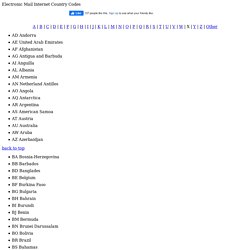
Education Resources for Web Literacy. 5 Must-Have Google Search Tips for Students. For those of us who remember a time before the internet, using Google for research might feel strange -- like being thrust from the cozy confines of a favorite library straight into the Wild West of the web.
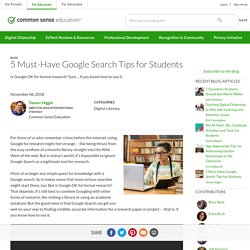
But in today’s world, it’s impossible to ignore Google Search as a legitimate tool for research. Most of us begin any simple quest for knowledge with a Google search. So it makes sense that more serious searches might start there, too. But is Google OK for formal research? That depends. Essential Google Search Tricks for Research. Website Evaluation - Preuss School - LibGuides at University of California San Diego. Web Literacy for Student Fact-Checkers – Simple Book Production. How to Use Google Search More Effectively [INFOGRAPHIC] Among certain circles (my family, some of my coworkers, etc.)
![How to Use Google Search More Effectively [INFOGRAPHIC]](http://cdn.pearltrees.com/s/pic/th/google-effectively-infographic-223541147)
I'm known for my Googling skills. I can find anything, anywhere, in no time flat. My Google-fu is a helpful skill, but not one that's shrouded in too much mystery — I've just mastered some very helpful search tricks and shortcuts and learned to quickly identify the best info in a list of results. Sadly, though web searches have become and integral part of the academic research landscape, the art of the Google search is an increasingly lost one.
Available Lessons – New Literacies Alliance. Reading Scientific Research Opens in a new windowAcademic research articles have a structure and language that is different from our other reading materials such as textbooks. Where Should I Search? It Depends! Short Description: The Value of Free and Deep Web Resources (aka Google vs.
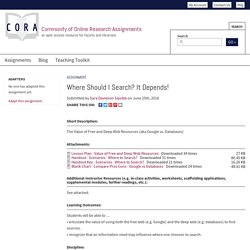
Databases) Additional Instructor Resources (e.g. in-class activities, worksheets, scaffolding applications, supplemental modules, further readings, etc.): See attached. Learning Outcomes: Identifying High-Quality Sites (6-8) Research and Style manual: citation for grades 1-6. How Search Works. Are Your Students Thinking Critically? Every teacher’s goal is for students to use critical thinking in the work they do.
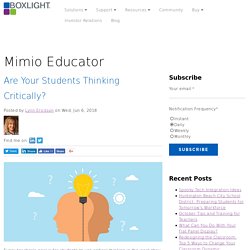
Students who can think critically grow into lifelong problem solvers. Critical thinking with students means that they can take information and analyze it, draw conclusions, form and defend opinions with data to back it up, reflect on their work, and approach problems in a systematic way. Where does that begin in the classroom? Databases - Leanne Morgan – Information Literacy Aficionado. There's So Much on the Web! Helping Students Become Internet-Research Savvy. No matter how much we emphasize the importance of books and databases, the reality is our students are using the Internet for research and will continue to do so.
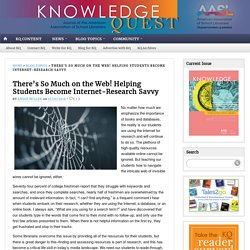
The plethora of high-quality resources available online cannot be ignored. But teaching our students how to navigate the intricate web of invisible wires cannot be ignored, either. How To Spot Fake News. Critical thinking is a key skill in media and information literacy, and the mission of libraries is to educate and advocate its importance. Discussions about fake news has led to a new focus on media literacy more broadly, and the role of libraries and other education institutions in providing this. When Oxford Dictionaries announced post-truth was Word of the Year 2016, we as librarians realise action is needed to educate and advocate for critical thinking – a crucial skill when navigating the information society.
IFLA has made this infographic with eight simple steps (based on FactCheck.org’s 2016 article How to Spot Fake News) to discover the verifiability of a given news-piece in front of you. Download, print, translate, and share – at home, at your library, in your local community, and on social media networks. The more we crowdsource our wisdom, the wiser the world becomes. Download the infographic. How can kids figure out what's credible news and what's fake news? How to Spot Fake News (and Teach Kids to Be Media-Savvy) EMBARGOED to Monday, November 20, 2017. News and Australian Children, How Young People Access, Perceive and are Affected by the News small1.
How Savvy are Your Students?: 7 Fake Websites to Really Test Their Evaluation Skills - EasyBib Blog. Top Reasons to use Databases. 5 Research Tools Students Often Overlook. When they're given a research assignment most students immediately turn to Google to start their research.
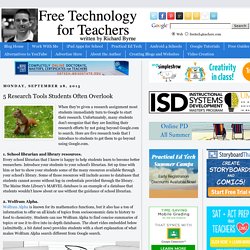
Truth, truthiness, triangulation: A news literacy toolkit for a “post-truth” world. We were guaranteed a free press, We were not guaranteed a neutral or a true press.
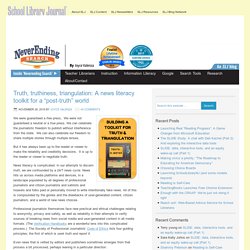
We can celebrate the journalistic freedom to publish without interference from the state. Fake News, Alternative Facts and Librarians As Dedicated Defenders of Truth. Let's be clear, there's no such thing as "alternative facts. " The same fact can be used by different people to support alternative opinions, but the facts don't change.
Different people can use the same facts to emphasize alternative ideas or to inform different theories, but the facts remain the same. Facts are non-partisan. Facts alone are neutral. It's what we do with them that becomes controversial. Identifying Fake News: An Infographic and Educator Resources - EasyBib Blog. Website credibility.